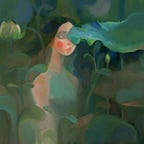A Performance of Being Asian American in the 21st Century: A Review of Chen Chen’s YOUR EMERGENCY CONTACT HAS EXPERIENCED AN EMERGENCY.
Chen Chen’s second poetry collection, Your Emergency Contact Has Experienced An Emergency, is heartbreakingly raw, yet shines a light on the beauty of relationships and the human need to nurture and hold each other. From tercets, prose poems, and other daring experimental forms, Chen utilizes language as a way to show tenderness amongst dark times — through a bold journey of living as a queer Asian American through the COVID-19 pandemic under a president whose promotion of racism and white supremacist values brought great harm to the Asian American community. Chen tells these stories with luminous courage. He shares grief through internalized homophobia, and at one point says his parents “are not his emergency contacts & have exhibited clear signs of wishing he were dead, such as saying in a clear voice, You’d be better off dead. Better than whatever you are with other men…”
These powerful emotions exist throughout the collection, particularly in the queer themes and the discussion of homophobia prevalent. As a diasporic Asian child of homophobic parents, the lines “Reporters & fathers call your generation ‘the worst.’ / Which really means ‘queer kids who could go online & learn that queer doesn’t have to mean disaster.’ / Or dead.” reverberated in my heart with both a visceral and haunting feeling. And such lyrical truths exist at each threshold, particularly of the immigrant experience and of cultural displacement: “Tony will toss out a dog-eared copy / of the manual he received upon arriving in America — / How to Have Deeply Sorrowful Exchanges / with Your Son About Your Immigrant Hardships: / How to Make Him Understand He Must Become / a Neurosurgeon/At Least a Dentist.” With humor, Chen successfully captures the expectations of Asian parents (mine have discovered with horror and sheer disappointment and shock that I am not becoming a doctor, nor a dentist, not even a pharmacist — very much against their wishes and dreams).
The voice of these poems is haunting and passionate, daring to interrogate the racist undertones of American academia. One of Chen’s interrogations, “When the 30-something white guy in poetry class says A poem is this — , based / on what a 70-something white guy once said & everyone just nods & I want to say No & scream & would Frost have called / me a chink?,” echoes my own feelings about studying American and British literature. I swallowed Sylvia Plath’s poetry like a necessary pill, and the other white poets deemed necessary for my complete understanding of the greatest British literary muses, all of whom were white like Shakespeare, Larkin, Shelley, etc. But it’s impossible to ignore, too, how these romanticized white poets would feel about people of color like us. Hasn’t the literary darling of poetry whom we study — Sylvia Plath — used racial stereotypes? The protagonist of The Bell Jar at one point describes her reflection as a “big, smudgy-eyed Chinese woman staring idiotically into my face.”
Chen Chen captures snippets of philosophies into these humorous poems, brimming with emergency calls and unsent love letters, and odes to foods, dogs, and boys over the years. This collection is a performance of what it means to be a queer Asian in the twenty-first century, and of searching for hope amongst blood and violence. It is vulnerable and it is sublime. It is worthy of tearing your heart into a “School of Eternities.” I will be carrying these poems and bringing them to my two queer Asian friends huddled together under a half-broken fan that crackles in the Asian cash-and-carry.
Then, it’ll be three queers admiring the craft of another queer Asian whilst sipping on karak chai or another order of bubble tea.
It’ll be “Three queers staying up until late becomes early” to read this poetry collection — to finish these important letters to Asians on academia, homophobia, and understand what it means when your emergency contacts have experienced an emergency.
